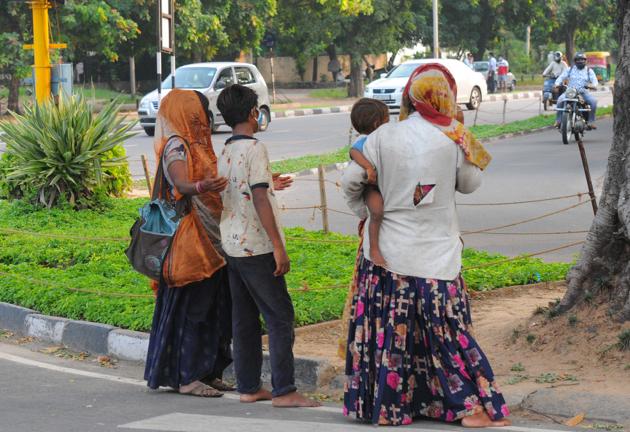HT Chandigarh our take: Stop begging in tricity at any cost
Given that the tricity is also coping with the Covid-19 pandemic, to have people subsisting on meagre earnings from begging, living in unhygienic conditions and sleeping in the open is clearly an invitation to disaster.
UT adviser Manoj Parida’s recent tweet urging Chandigarh residents not to give money to beggars clearly highlights the administration’s failure in rehabilitating beggars.

Parida said the beggars could not be jailed since “beggary is not a crime,” to which Rajesh Jogpal, a Haryana-cadre Indian Administrative Services (IAS) officer and former Panchkula MC commissioner, responded (also in a tweet): “The Chandigarh administration has adopted Haryana Prevention of Beggary Act 1971, under which beggary is a crime.”
Jogpal also said that Chandigarh had three certified institutions to house people nabbed for begging. Provisions say they can’t be jailed, but put in these institutions.
Given that the tricity is also coping with the Covid-19 pandemic, to have people subsisting on meagre earnings from begging, living in unhygienic conditions and sleeping in the open is clearly an invitation to disaster.
Not just that, to have families without a source of income, living under the open skies with no idea where their next meal is coming from, underlines the failure of society to provide them the requisite support to help them join the mainstream.
Tricity authorities should realise that simply allowing people to beg reflects badly on them and on their will, administrative capabilities or whatever you choose to call it, to do everything possible to end this problem. Right thinking individuals in charge should put their heads together to look for a way out – including providing beggars skills training, mental and physical health treatment, drug rehabilitation, education and work.
A sustained rehabilitation programme to mainstream them with a source of livelihood as well as social intervention seems to be the best solution.
People who give money to beggars and encourage idleness and crime should also be penalised.
The lockdown after the Covid-19 outbreak too has led to millions of jobs drying up. If urgent measures are not taken going forward to generate more employment, begging and associated health and law and order problems are set to rise exponentially.
Can an exhaustive survey be undertaken to identify beggars in the tricity and cross-border checks imposed to make them stay within their own territories? From family planning measures to education – can the remaining beggars then be monitored and rehabilitated?
This is the time to put an end to an age-old scourge that Indians have become accustomed to living with. How society can figure out a way to do this is the bigger question.
THE END
What is the best solution to the problem of begging?
What needs to be done to stop this problem of begging? Send your responses with a photograph to Chandigarh@hindustantimes.com by August 7.






